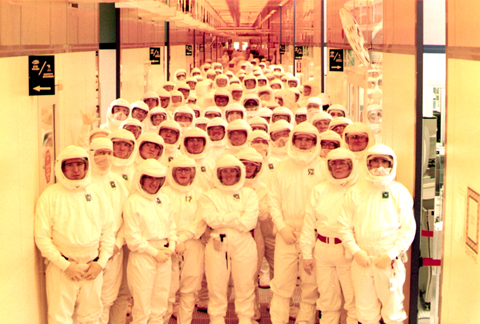Intel Corp plans to spend US$7 billion upgrading its US factories over the next two years, a sign that the recession hasn’t extinguished chipmakers’ lust for cutting-edge equipment.
The company’s investment, announced on Tuesday by Intel CEO Paul Otellini at a speech in Washington, speaks to the semiconductor industry’s need to keep investing heavily, regardless of the poor economic climate that has led Intel to cut jobs.
The investment could be a boon to firms that produce chip-making equipment, like Applied Materials Inc and KLA-Tencor Corp, and is another example of how Intel’s deep pockets have kept rival Advanced Micro Devices Inc (AMD) at bay.

PHOTO: EPA/INTEL
AMD, having lost nearly US$7 billion over the past two years, wants to break off its factories into a separate company to unload debt and save money. A shareholder vote was scheduled for Tuesday, but was postponed until next week because only 42 percent of investors had voted. AMD needed at least half to go forward.
Intel is struggling with the worst PC market in years. Overall semiconductor sales fell last year for the first time in seven years, slipping about 3 percent to US$249 billion, the Semiconductor Industry Association said.
Yet Intel says its latest investment is the most it has ever spent on a transition to new manufacturing technology.
It said the US$7 billion would pay for new machinery at factories in Oregon, Arizona and New Mexico, which will be outfitted to produce chips based on 32-nanometer technology.
But Intel’s investment doesn’t necessarily mean lots of new jobs will be created. he money will pay the salaries of about 7,000 “high-wage, high-skill” jobs that already exist at those plants.
The investment comes as Intel is cutting up to 6,000 manufacturing jobs by closing plants in Malaysia and the Philippines and stopping production at facilities in Oregon and California.

MORE VISITORS: The Tourism Administration said that it is seeing positive prospects in its efforts to expand the tourism market in North America and Europe Taiwan has been ranked as the cheapest place in the world to travel to this year, based on a list recommended by NerdWallet. The San Francisco-based personal finance company said that Taiwan topped the list of 16 nations it chose for budget travelers because US tourists do not need visas and travelers can easily have a good meal for less than US$10. A bus ride in Taipei costs just under US$0.50, while subway rides start at US$0.60, the firm said, adding that public transportation in Taiwan is easy to navigate. The firm also called Taiwan a “food lover’s paradise,” citing inexpensive breakfast stalls

TRADE: A mandatory declaration of origin for manufactured goods bound for the US is to take effect on May 7 to block China from exploiting Taiwan’s trade channels All products manufactured in Taiwan and exported to the US must include a signed declaration of origin starting on May 7, the Bureau of Foreign Trade announced yesterday. US President Donald Trump on April 2 imposed a 32 percent tariff on imports from Taiwan, but one week later announced a 90-day pause on its implementation. However, a universal 10 percent tariff was immediately applied to most imports from around the world. On April 12, the Trump administration further exempted computers, smartphones and semiconductors from the new tariffs. In response, President William Lai’s (賴清德) administration has introduced a series of countermeasures to support affected

CROSS-STRAIT: The vast majority of Taiwanese support maintaining the ‘status quo,’ while concern is rising about Beijing’s influence operations More than eight out of 10 Taiwanese reject Beijing’s “one country, two systems” framework for cross-strait relations, according to a survey released by the Mainland Affairs Council (MAC) on Thursday. The MAC’s latest quarterly survey found that 84.4 percent of respondents opposed Beijing’s “one country, two systems” formula for handling cross-strait relations — a figure consistent with past polling. Over the past three years, opposition to the framework has remained high, ranging from a low of 83.6 percent in April 2023 to a peak of 89.6 percent in April last year. In the most recent poll, 82.5 percent also rejected China’s

PLUGGING HOLES: The amendments would bring the legislation in line with systems found in other countries such as Japan and the US, Legislator Chen Kuan-ting said Democratic Progressive Party (DPP) Legislator Chen Kuan-ting (陳冠廷) has proposed amending national security legislation amid a spate of espionage cases. Potential gaps in security vetting procedures for personnel with access to sensitive information prompted him to propose the amendments, which would introduce changes to Article 14 of the Classified National Security Information Protection Act (國家機密保護法), Chen said yesterday. The proposal, which aims to enhance interagency vetting procedures and reduce the risk of classified information leaks, would establish a comprehensive security clearance system in Taiwan, he said. The amendment would require character and loyalty checks for civil servants and intelligence personnel prior to